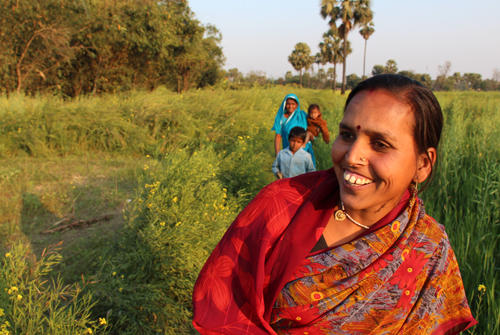Celebrating smallholder farmers and rural women - DG Dialogues

M. Ann Tutwiler, Director General, Bioversity International, takes the opportunity of International Women's Day to draw attention to the role of women farmers in her latest blog post.
M. Ann Tutwiler, Director General, Bioversity International, takes the opportunity of International Women's Day to draw attention to the role of women's farmers in her latest blog post.
The 2 billion smallholder farmers who live in developing countries – often women – produce the majority of the world’s food, yet most live in extreme poverty.
Women farmers often produce less than their male counterparts because of less access to or ownership of land, fewer inputs and less access to extension services. Women also provide nutrition to their children and families, putting agricultural resources on their tables every day.
Recognizing the contribution of women to agriculture is critical to achieve global food security. Many smallholder farmer women are also the custodians of biodiversity, conserving and using their agricultural resources. Paragraph 13 of the Preamble of the Convention on Biological Diversity recognizes “the vital role that women play in the conservation and sustainable use of biological diversity and affirming the need for the full participation of women at all levels of policy making and implementation for biological diversity conservation.”
These are some of the many reasons Bioversity International has been highlighting the role of women in agriculture as part of International Women’s Day celebrations this weekend.
Women make up a substantial part of the rural workforce. They produce 80% of staple food in Africa and up to 60% in some parts of Asia — yet are often the last to benefit from economic development. Women smallholders, who on average account for about 55% of the labour force and carry out about 70% of farm work in Africa, represent just 8% of land ownership.
Imagine how different our world could be...
... if women had the same access to productive resources as men they could increase yields on their farms by 20-30%. This could raise total agricultural output in developing countries by 2.5-4%, which could in turn reduce the number of hungry people in the world by 12-17%.
Bioversity and our CGIAR partners include gender as a cross-cutting theme in all of our work. In particular, Bioversity explores the roles that women and men have in our agricultural and food systems, and in conserving and using diversity in our fields, farms, gardens and forests.
Here are several examples of women inspiring change from our research initiatives:
- Seeds for Needs: Bioversity International's 'Seeds for Needs' initiative works with farmers to research how agricultural biodiversity can help minimize the risks associated with climate change. The idea is that if farmers have more access to an array of crops and varieties, they are more likely to cope with unpredictable weather. Mamta Kumari is one of the farmers we work with in Bihar, a fertile but relatively poor state in India. She is the leader of the women’s group, and is a former teacher who is participating in our research by serving as a 'citizen scientist' to report back on the crop performance of different varieties. Watch a short video.
- African Leafy Vegetables: In the early 1990s, scientists in Kenya noticed that traditional African leafy vegetables were rapidly disappearing from farmers’ fields and people’s tables. Bioversity and its partners in Kenya set out to reverse this trend and conserve the traditional vegetables. As a result, the area under cultivation increased by 69 percent. An impact assessment study in 2007 showed that nearly two-thirds of households surveyed growing African leafy vegetables increased their income, with women being the main beneficiaries. In almost 80 per cent of households surveyed, it was the women exclusively who kept the income from sales of African leafy vegetables. Watch a short video.
- Minor millets: Millet, one of the world’s oldest and most versatile grains, has been part of the food culture of India and Nepal for millennia. Yet in spite of its traditional importance, it has been marginalized in recent decades, with farmers encouraged to grow commercial crops such as rice and wheat to sell rather than grow their traditional crops for family subsistence and barter. In India, Bioversity International and partners worked with 200 farming families to revive the cultivation of minor millets. As a result, Indian minor millet growers increased their yields by 70% and their income by 30%. Women farmers integrated millets into innovative snack foods, which have reached urban markets and are now consumed in schools. Watch a short video.
- Gender and trees resources: Bioversity International coordinates a Gender Research Fellowship Programme as part of the CGIAR Research Program on Forests, Trees and Agroforestry. Through this programme, research fellows in sub-Saharan Africa, Central Asia, and South and Southeast Asia are studying the differences in women's and men's knowledge, skills and management practices regarding tree resources. The Fellows study distinctions in women’s and men’s ecological knowledge, access to forest resources, and access to markets for non-timber forest products, among other themes, across regional contexts. The knowledge generated will help develop more effective and equitable resource conservation and management opportunities. Find out more.
The International Year of Family Farming puts the spotlight on the complementarity of women's and men's roles in family farming. Both are important; but women’s contributions to agriculture and biodiversity have not been fully explored nor recognized.
Join me in celebrating women’s contributions to agricultural and forest biodiversity and to our food secure future.
M. Ann Tutwiler
Email: M. Ann Tutwiler
Photo: Mamta Kumari, Leader of women's group in Bihar, India - part of the Seeds for Needs Initiative. Credit: Bioversity International/C. Zanzanaini
